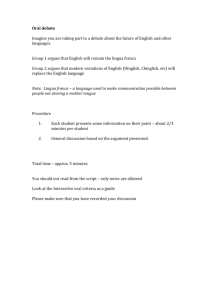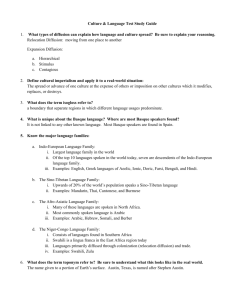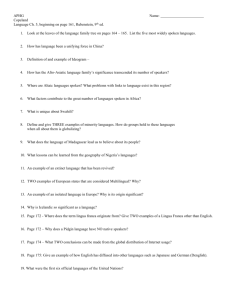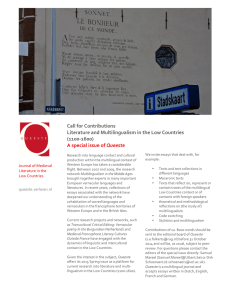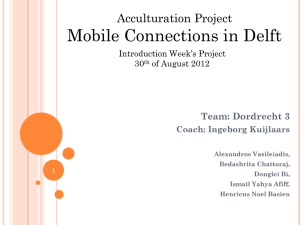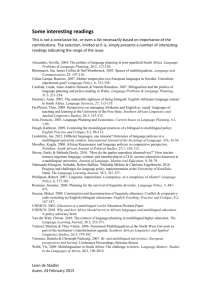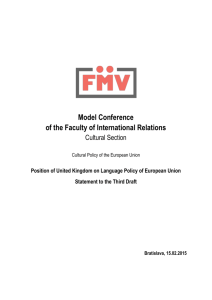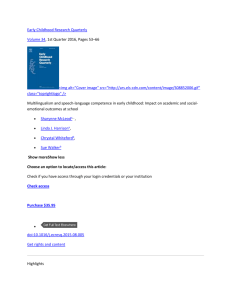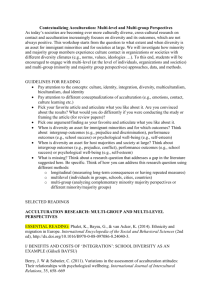pre ica programme and abstracts june 2013
advertisement
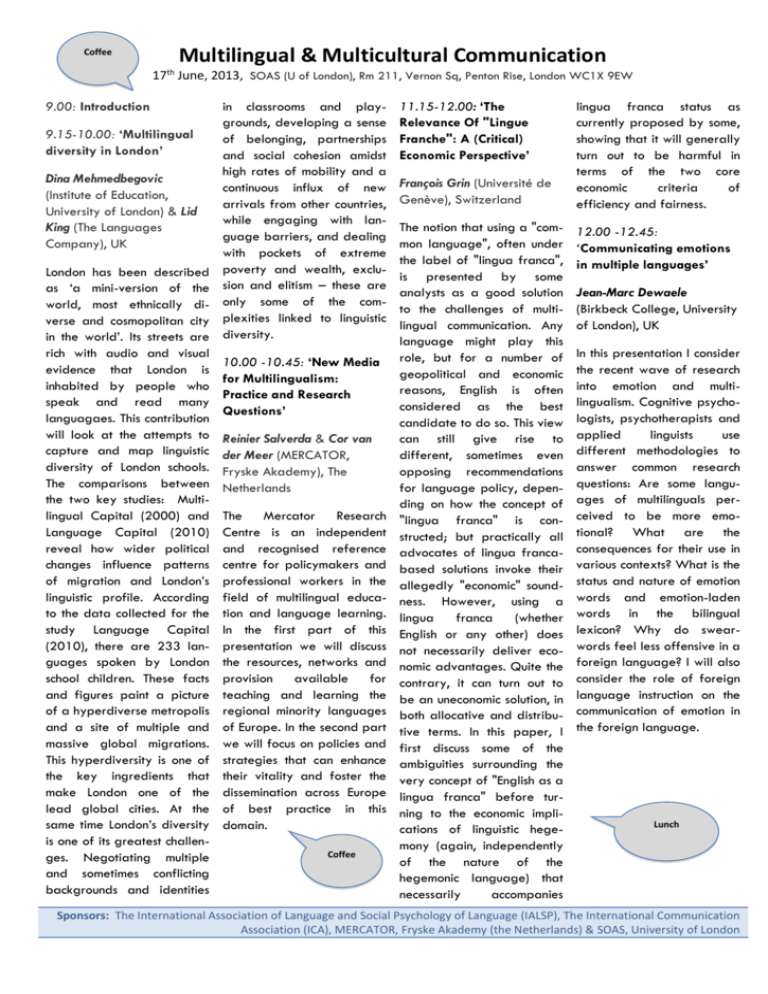
Coffee Multilingual & Multicultural Communication 17th June, 2013, SOAS (U of London), Rm 211, Vernon Sq, Penton Rise, London WC1X 9EW 9.00: Introduction 9.15-10.00: ‘Multilingual diversity in London’ Dina Mehmedbegovic (Institute of Education, University of London) & Lid King (The Languages Company), UK London has been described as ‘a mini-version of the world, most ethnically diverse and cosmopolitan city in the world’. Its streets are rich with audio and visual evidence that London is inhabited by people who speak and read many languagaes. This contribution will look at the attempts to capture and map linguistic diversity of London schools. The comparisons between the two key studies: Multilingual Capital (2000) and Language Capital (2010) reveal how wider political changes influence patterns of migration and London’s linguistic profile. According to the data collected for the study Language Capital (2010), there are 233 languages spoken by London school children. These facts and figures paint a picture of a hyperdiverse metropolis and a site of multiple and massive global migrations. This hyperdiversity is one of the key ingredients that make London one of the lead global cities. At the same time London’s diversity is one of its greatest challenges. Negotiating multiple and sometimes conflicting backgrounds and identities in classrooms and playgrounds, developing a sense of belonging, partnerships and social cohesion amidst high rates of mobility and a continuous influx of new arrivals from other countries, while engaging with language barriers, and dealing with pockets of extreme poverty and wealth, exclusion and elitism – these are only some of the complexities linked to linguistic diversity. 10.00 -10.45: ‘New Media for Multilingualism: Practice and Research Questions’ Reinier Salverda & Cor van der Meer (MERCATOR, Fryske Akademy), The Netherlands The Mercator Research Centre is an independent and recognised reference centre for policymakers and professional workers in the field of multilingual education and language learning. In the first part of this presentation we will discuss the resources, networks and provision available for teaching and learning the regional minority languages of Europe. In the second part we will focus on policies and strategies that can enhance their vitality and foster the dissemination across Europe of best practice in this domain. Coffee 11.15-12.00: ‘The Relevance Of "Lingue Franche": A (Critical) Economic Perspective’ François Grin (Université de Genève), Switzerland The notion that using a "common language", often under the label of "lingua franca", is presented by some analysts as a good solution to the challenges of multilingual communication. Any language might play this role, but for a number of geopolitical and economic reasons, English is often considered as the best candidate to do so. This view can still give rise to different, sometimes even opposing recommendations for language policy, depending on how the concept of "lingua franca" is constructed; but practically all advocates of lingua francabased solutions invoke their allegedly "economic" soundness. However, using a lingua franca (whether English or any other) does not necessarily deliver economic advantages. Quite the contrary, it can turn out to be an uneconomic solution, in both allocative and distributive terms. In this paper, I first discuss some of the ambiguities surrounding the very concept of "English as a lingua franca" before turning to the economic implications of linguistic hegemony (again, independently of the nature of the hegemonic language) that necessarily accompanies lingua franca status as currently proposed by some, showing that it will generally turn out to be harmful in terms of the two core economic criteria of efficiency and fairness. 12.00 -12.45: ‘Communicating emotions in multiple languages’ Jean-Marc Dewaele (Birkbeck College, University of London), UK In this presentation I consider the recent wave of research into emotion and multilingualism. Cognitive psychologists, psychotherapists and applied linguists use different methodologies to answer common research questions: Are some languages of multilinguals perceived to be more emotional? What are the consequences for their use in various contexts? What is the status and nature of emotion words and emotion-laden words in the bilingual lexicon? Why do swearwords feel less offensive in a foreign language? I will also consider the role of foreign language instruction on the communication of emotion in the foreign language. Lunch Sponsors: The International Association of Language and Social Psychology of Language (IALSP), The International Communication Association (ICA), MERCATOR, Fryske Akademy (the Netherlands) & SOAS, University of London 2.00-2.45: ‘Cyberspace and ‘reviving’ or stimulating bilingualism in young male and female “dormant” bilinguals’ Anne Pauwels (SOAS, University of London), UK Research on bi- and multilinguals in migrant settings has provided strong evidence that those migrating at a young age and those born to migrant parents (often referred to as ‘second generation’) are likely to undergo a (significant) degree of language shift, sometimes resulting in a complete abandoning of the ‘heritage’ language. Particularly at risk are young people whose peers and social networks do not display positive attitudes towards linguistic diversity or difference. Public exposure of heritage language use is experienced negatively by such youngsters leading them to ‘hide’ their heritage language, severely restricting its use to older family members, or abandoning it altogether. The advent of internet-based communication and other forms of technology-mediated language practices has had a significant impact not only on available and preferred modes of interaction but also on the notions of private and public communication. Through the internet one can engage in a range of communicative practices which provide privacy for the interlocutors, but which take place in public virtual spaces reaching a large number of people. Such communicative environments may constitute ‘safe’ places for young bilinguals in which to use, practice, and enhance their bilingual practices. Here I present some case studies of young bilinguals exploring the impact of the internet on their communicative practices linked to the heritage language. Specific attention is paid to what extent this site – the internet – creates gendered communicative practices that may result in different levels of bilingualism among young bilinguals. 2.45-3.30: ‘Diasporas: Multilingual and intercultural communication across time and space’ Li Wei (Birkbeck College, University of London), UK One of the key characteristics of the diaspora is its complex connections with people of a common root across geographic locations as well as historical times. The nature and quantity of the connections vary from one place to another and change over time. This talk addresses some of the communication issues associated with diasporas. Multilingualism and multiculturalism feature highly in diaspora communication. Communication with others of the same cultural heritage but dispersed in different places, and across generations and age groups, is a typical, everyday pheno- menon. Multilingual and intercultural communication can also create new spaces for communication. Members of the diaspora learn new and different things from each other, resulting in new knowledge and identity construction. Understanding how members of the diasporas communicate with each other across space and time provides important insights into multilingual and intercultural communication more generally. Tea 4.00-4.45: ‘The dynamics of acculturation: an intergroup perspective’ attitudes as a determinant of intergroup attitudes; (4) the importance of the intergroup climate in which acculturation takes place; (5) acculturation as a process – developmental and longitudinal perspectives. I will present research to illustrate each of these points. Longitudinal and experimental studies, rarities in the acculturation literature, will figure prominently. Research settings include Turkish-German relations in Germany, Indigenous-Non-indigenous relations in Chile, African migrants to Italy and ethnic majority-minority relations in the UK. 4.45-5.30: ‘Modelling Multilingual & Multicultural Communication’ Rupert Brown (Sussex University), UK Howard Giles (UCSB), USA & Itesh Sachdev (SOAS, The growing global trend of University of London), UK migration gives social psychological enquiry into In an era of globalisation, acculturation processes par- this presentation will discuss ticular contemporary rele- the place of multilingualism vance. Inspired by one of not only in current disciplines the earliest definitions of but also in emerging cosmoacculturation (Redfield et al., 1936), I will present a case politan identities and notions for considering acculturation of global citizenship. It aims as a dynamic intergroup to bring together the diverse process. I first briefly review strands of research and research stimulated by the models to develop core dominant perspective in the aspects and principles field, Berry’s acculturation concerning multilingual & framework. Noting several limitations of that work, I multicultural communication. identify five issues which have helped to define our own research agenda over 5:30 Reception the past decade: (1) the mutual influence of acculturation preferences and intergroup attitudes; (2) the influence of the perceived acculturation attitudes of the outgroup; (3) discrepancies between ingroup and outgroup acculturation Organisers: Itesh Sachdev (i.sachdev@soas.ac.uk) & Howard Giles (howiegiles@cox.net)
